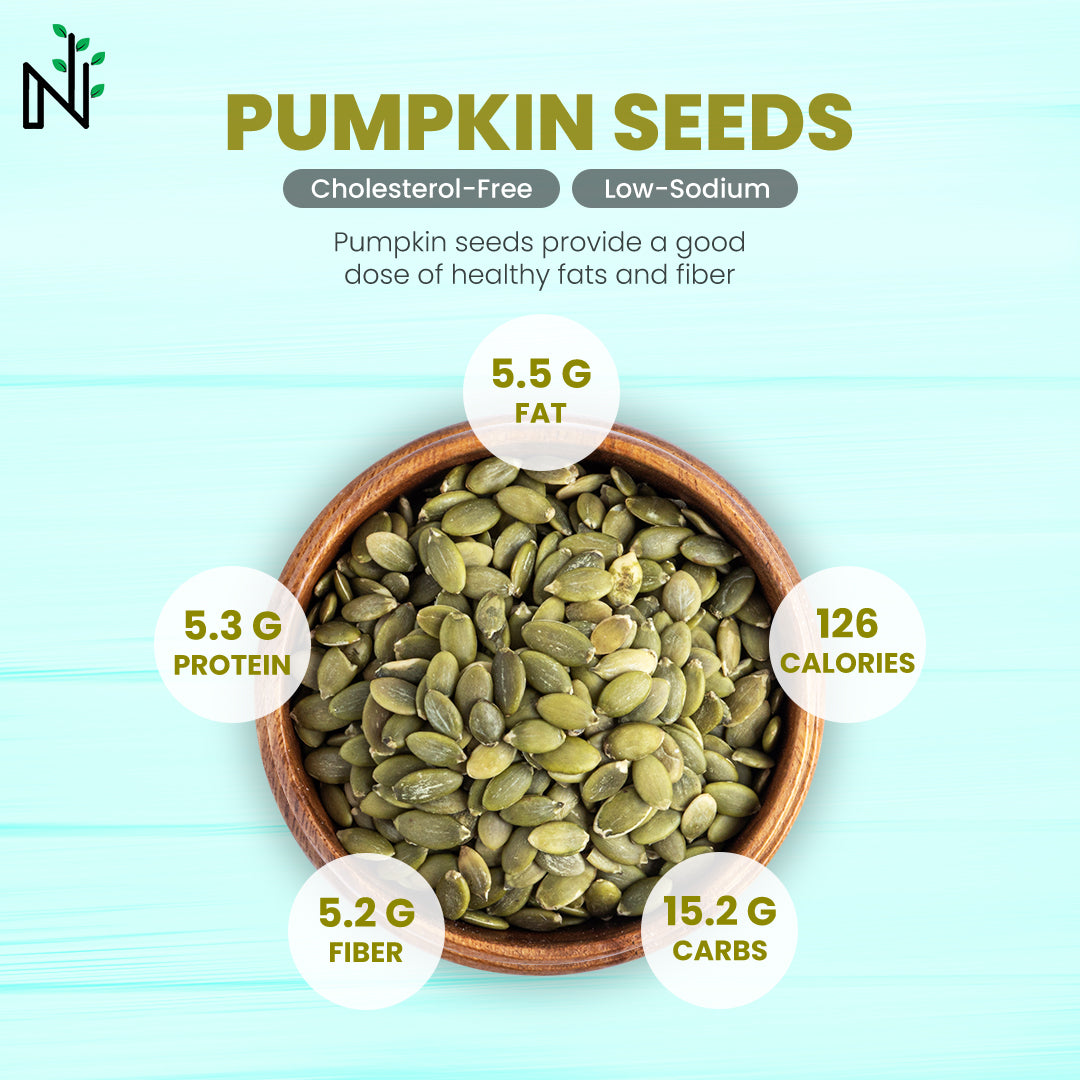
Pumpkin Seeds - Health Benefits, Nutrition, Facts, Uses, Recipes
Share
Pumpkin seeds, also known as pepitas, are an excellent source of essential nutrients and minerals. These small, flat seeds are packed with protein, fiber, healthy fats, vitamins, and minerals, making them an excellent addition to a healthy diet. In this article, we'll discuss the health benefits of pumpkin seeds, how to eat them, and some easy-to-make recipes.
Types of Pumpkin Seeds:
Pumpkin seeds are available in various types, each with its unique characteristics and benefits. Some of the common types of pumpkin seeds are:
-
White pumpkin seeds: These seeds are known for their sweet taste and smooth texture. They have a thin white shell and are perfect for roasting or adding to trail mix.
-
Green pumpkin seeds: Also known as pepitas, these seeds are popular in Mexican cuisine. They have a dark green shell and a mild nutty flavor.
-
Raw pumpkin seeds: Raw pumpkin seeds are unroasted and unsalted. They are an excellent source of nutrients and can be used in salads, smoothies, or granola.
-
Sprouted pumpkin seeds: Sprouted pumpkin seeds are raw pumpkin seeds that have been soaked and sprouted. They are easier to digest and contain more nutrients than raw pumpkin seeds.
-
Shelled pumpkin seeds: Shelled pumpkin seeds are pumpkin seeds with the outer shell removed. They are often used in recipes that call for ground pumpkin seeds or pumpkin seed butter.
Nutrition Information:

Pumpkin seeds are a rich source of various nutrients that offer numerous health benefits. Here is a breakdown of the macronutrients and micronutrients present in pumpkin seeds:
A. Macronutrients:
-
Calories and Serving Size: A 1-ounce serving of pumpkin seeds contains approximately 151 calories.
-
Protein and Amino Acids: Pumpkin seeds are an excellent source of protein, with a 1-ounce serving containing around 7 grams of protein. They also contain all nine essential amino acids, making them a complete protein source.
-
Fats and Essential Fatty Acids: Pumpkin seeds are a rich source of healthy fats, including monounsaturated, polyunsaturated, and omega-3 fatty acids. They also contain essential fatty acids like linoleic acid and alpha-linolenic acid.
-
Carbohydrates and Fiber: Pumpkin seeds are a low-carbohydrate food, with a 1-ounce serving containing only 5 grams of carbohydrates. They are also an excellent source of fiber, with a 1-ounce serving containing 1.7 grams of fiber.
B. Micronutrients:
-
Vitamins: Pumpkin seeds are a rich source of various vitamins, including vitamin K, vitamin E, and B-complex vitamins like thiamin, riboflavin, and niacin.
-
Minerals: Pumpkin seeds are an excellent source of minerals like magnesium, phosphorus, potassium, zinc, and iron.
-
Phytochemicals: Pumpkin seeds are also rich in phytochemicals like carotenoids and phytosterols, which have antioxidant and anti-inflammatory properties.
Health Benefits of Pumpkin Seeds:
-
Prostate Health: Pumpkin seeds are known to promote prostate health. They contain compounds that can help reduce inflammation and prevent the growth of prostate cells.
-
Parasite Prevention: Pumpkin seeds have anti-parasitic properties that can help get rid of intestinal worms and other parasites.
-
Heart Health: The high fiber content in pumpkin seeds can help lower cholesterol levels and improve heart health.
-
Cancer Prevention: Pumpkin seeds contain antioxidants and anti-inflammatory compounds that can help prevent cancer.
-
Better Sleep: The amino acid tryptophan found in pumpkin seeds can help improve sleep quality.
How to Eat Pumpkin Seeds:
-
Roasted Pumpkin Seeds: Roasting pumpkin seeds is an easy and delicious way to enjoy them. Rinse the seeds and spread them out on a baking sheet. Add some salt or your favorite seasoning, and roast at 350°F for about 15-20 minutes.
-
Toasted Pumpkin Seeds: Toasting pumpkin seeds in a dry pan can bring out their nutty flavor. Toast the seeds in a pan over medium heat for about 5-7 minutes, stirring occasionally.
-
Sweet Pumpkin Seeds: Add some sweetness to your pumpkin seeds by mixing them with honey or maple syrup before roasting.
-
Spicy Pumpkin Seeds: Add some heat to your pumpkin seeds by mixing them with cayenne pepper or chili powder before roasting.
-
Sprouted Pumpkin Seeds: Soak pumpkin seeds in water for a few hours or overnight to sprout them. Sprouted pumpkin seeds can be eaten raw or roasted.
Pumpkin Seed Recipes:

-
Pumpkin Seed Butter: Blend roasted pumpkin seeds in a food processor until smooth, and add some salt or sweetener to taste. Spread on toast or use as a dip.
-
Pumpkin Seed Granola: Mix roasted pumpkin seeds with rolled oats, nuts, and dried fruit, and bake in the oven with some honey and oil.
-
Pumpkin Seed Pesto: Blend roasted pumpkin seeds with fresh basil, garlic, olive oil, and Parmesan cheese to make a delicious pesto sauce.
-
Pumpkin Seed Soup: Puree roasted pumpkin seeds with chicken or vegetable broth, garlic, and onions to make a creamy and flavorful soup.
-
Pumpkin Seed Energy Bars: Mix roasted pumpkin seeds with oats, dates, almond butter, and honey, and press into a pan to make healthy and tasty energy bars.
Where to Buy Pumpkin Seeds:
Pumpkin seeds are widely available in online stores, health food stores, and online. The price of pumpkin seeds can vary depending on the brand, type, and quality. Natural & Pure pumpkin seeds and sprouted pumpkin seeds are typically more expensive than regular raw or roasted seeds.
Best place to buy A-grade quality Pumpkin Seeds is "The Nature's Store"
FAQ's
-
Is it OK to eat pumpkin seeds everyday?
Yes, it is safe to eat pumpkin seeds every day in moderation. Pumpkin seeds are packed with nutrients that offer several health benefits, such as improved heart health, better bone health, and lower risk of cancer.
-
Can pumpkin seeds be eaten raw?
-
Are Pumpkin Seeds Fattening?
-
What are the side effects of eating Pumpkin Seeds?
-
How much Pumpkin Seeds to eat daily?
-
Do pumpkin seeds expire?
-
Can pumpkin seeds help with hair loss?
-
Are pumpkin seeds safe for dogs to eat?
-
Are pumpkin seeds a good source of protein for vegetarians and vegans?
-
Do roasted pumpkin seeds have the same nutritional value as raw pumpkin seeds?
-
Can pumpkin seeds help with menopause symptoms?
-
Do pumpkin seeds contain allergens?
-
Can pumpkin seeds help with bladder control?
Final Thoughts:
Pumpkin seeds are a nutritious and versatile food that can be eaten on their own or added to various recipes. They are a great source of protein, fiber, healthy fats, and minerals that can help improve overall health. Whether you prefer them roasted, sweet, spicy, or sprouted, pumpkin seeds are an easy and tasty way to add some extra nutrition to your diet.
